Ministry of Jal Shakti
DDWS Leads 3rd District Collectors’ Peyjal Samvad to Strengthen Rural Water Governance and Service Delivery
Direct Dialogue with DC/DMs on Sustenance of Schemes take Centrestage
Handing Over Protocol: “Jan Bhagidari se Jal Arpan”
Grassroot Leadership and Community Ownership Reaffirmed as Core Priorities
प्रविष्टि तिथि:
27 NOV 2025 7:39PM by PIB Delhi
The Department of Drinking Water and Sanitation today held the 3rd edition of the District Collectors’ Peyjal Samvad, a platform designed to deepen district-level engagement and strengthen the quality and sustainability of drinking water services.
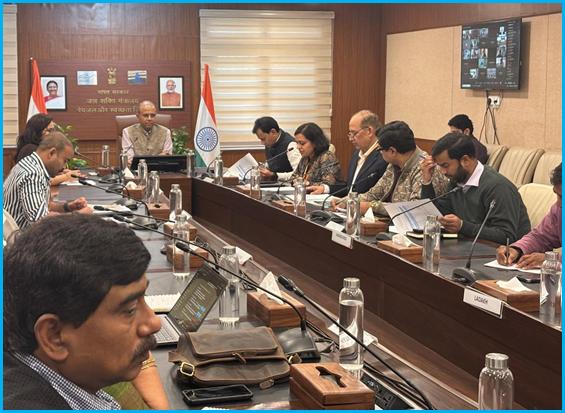
With the central theme – “From Grassroot to Forefront”, the discussions focused on real-time service delivery performance, infrastructure functionality, source sustainability, water quality concerns, and last-mile governance, with district presentations providing data-backed insights rather than procedural updates.
Held through virtual conference mode, the District Collectors’ Peyjal Samvad was chaired by Secretary, DDWS, Shri Ashok K.K. Meena. He emphasised that while the creation of assets has been an important milestone, the real test now lies in ensuring that quality water flows every day, building trust in the communities. He stressed that effective operation and maintenance is central to achieving this, and that Gram Panchayats therefore have a critical role as the institutions closest to the people.
Smt. Ankita Chakravarty, Deputy Secretary-NJJM, in her welcome remarks, stated that so far, more than 530 District Collectors have shared recordings of their DWSM meetings, giving insights into issues such as source sustainability, O&M, leakages, tariffs and water quality. Over 85,000 Panchayats have also accessed the Panchayat Dashboard to see their own data – how many households receive water, which schemes are functional and what quality tests show. She said that this access to information is helping Panchayats understand and manage their systems better. The recent Sujal Gram Samvad further showed that Panchayat members are willing to take responsibility when they are given information, training and support.
Presentation on Commissioning & Handing Over Protocol
A key segment of the District Collectors’ Peyjal Samvad featured a detailed presentation by Shri Sumit Priyadarshi, Deputy Advisor-NJJM, on the Commissioning Protocol and Handing Over Protocol for Rural Water Supply Schemes. The presentation provided a structured, four-phase validation framework designed to ensure quality, transparency, and sustainability of Rural Piped Water Supply Schemes (RPWSS).
Four-Phase Commissioning Framework
- Pre-Commissioning Documentation: As-built drawings, defect assessment, design compliance.
- System Testing: Pressure testing, water quality verification, disinfection, flow and capacity testing.
- Trial Operations: 7-14 days of continuous evaluation under real conditions.
- Final Documentation: Commissioning reports, manuals, certifications, and digital integration into platforms such as JJM-WQMIS and PM Gati Shakti.
The Handing Over Protocol, introduced earlier this month in a national event where the Union Minister for Jal Shakti, Shri C.R. Patil, released a dedicated handbook, was revisited. The protocol sets out a clear, uniform process for transferring completed schemes to Gram Panchayats and VWSCs, emphasising governance readiness, O&M training, transparent financial systems, BIS-compliant water quality checks and community-led oversight. It was also highlighted that the formal Handover Day will be celebrated as Jal Arpan Diwas across villages, marked by participatory activities such as Jal Bandhan, Pledge Ceremony and Cultural Programmes, reinforcing community ownership and long-term stewardship of local water systems.
District Presentations: Showcasing Innovation & Local Solutions
Deputy Commissioners/ District Magistrates from five districts across the country shared their field experiences, achievements, and strategies for strengthening rural water service delivery. The presenting districts included:
- Mamit, Mizoram
- Alluri Sitharama Raju, Andhra Pradesh
- SAS Nagar, Punjab
- Leh, Ladakh
- Ri Bhoi, Meghalaya
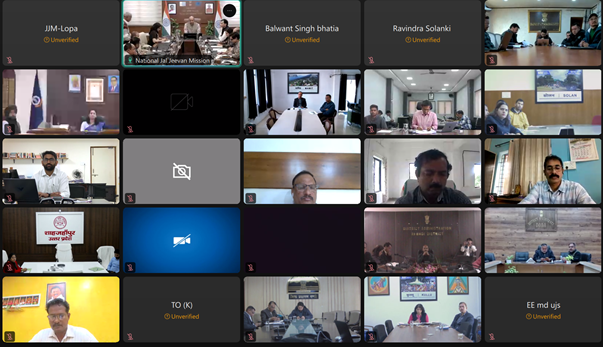
Mamit, Mizoram
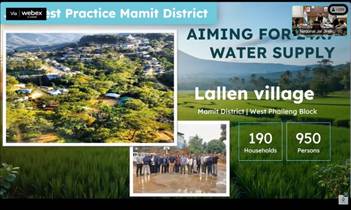
Shri K. Laltlawmlova, District Collector, Mamit District presented the progress of his district, with particular focus on Lallen village, where a community-led approach and the adoption of a solar-powered water supply system have enabled the shift towards 24×7 availability. The district highlighted renovation of the old gravity-fed system, replacement of aging pipelines and creation of new intake alignments, supported actively by local leaders.
Alluri Sitharama Raju, Andhra Pradesh
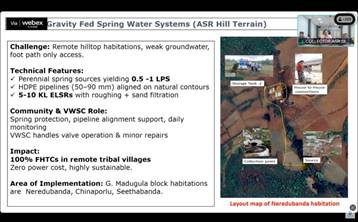
Shri A. S. Dinesh Kumar, Collector & District Magistrate, Alluri Sitharama Raju District, stated that the district, being a predominantly tribal region with one of the largest PVTG populations and highly fragile, loose-soil landscapes, faces distinct challenges in ensuring reliable drinking water where most habitations are accessible only by foot and groundwater fluctuates seasonally.
He highlighted the district’s tailored solutions, including gravity-fed spring systems, solar dual-pump systems, community-driven FTK monitoring and spring-shed management works taken up under MGNREGA to stabilise and protect vulnerable sources. With over 7,000 JJM works completed and 1.8 lakh household tap connections provided, the district is now focused on strengthening multi-village schemes and enhancing local O&M capacity for long-term sustainability.
SAS Nagar, Punjab
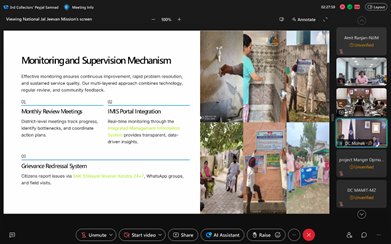
Smt. Komal Mittal, Deputy Commissioner, SAS Nagar District underscored the district’s achievement of 100% Functional Household Tap Connections, covering over 82,000 households along with all schools and anganwadis. She highlighted strong planning through Village and District Action Plans, robust Gram Panchayat-led implementation and a comprehensive water conservation and source sustainability strategy.
The district’s advanced water quality monitoring systems, including laboratory testing and continuous service-level reviews that ensure consistent and safe supply across all Gram Panchayats, were also stressed upon.
Leh, Ladakh
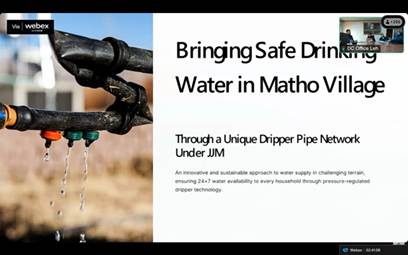
For Leh District, Shri Romil Singh Donk, Deputy Commissioner, highlighted the strong monitoring framework that combines institutional strengthening, ground-level verification, transparency mechanisms, and social accountability. This multi-layered approach ensures effective delivery and long-term sustainability of water supply schemes.
He cited an innovative and sustainable approach to water supply in the challenging terrain of Matho village, ensuring 24×7 water availability to every household through a unique pressure-regulated dripper technology even in sub-zero temperatures through controlled-flow drippers and frost-resistant design.
Ri Bhoi, Meghalaya
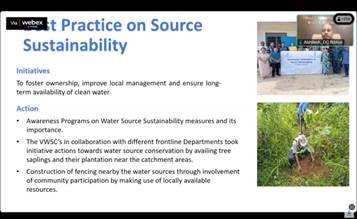
Shri Abhilash Baranwal, Deputy Commissioner, Ri Bhoi District, highlighted the district’s strong institutional framework and progress supported by more than 580 functional Village Water & Sanitation Committees. A key strength shared was the deep community involvement, especially the role of women, with over 2,600 women, five from every village, trained in field testing kits to support regular water quality surveillance. The district also presented its source sustainability work, including the community-led success in Pahamjri village.
In his concluding remarks, the AS&MD-NJJM, Shri Kamal Kishore Soan, urged States to familiarise themselves with the newly issued guidelines on commissioning and handing over, and emphasised the need to share these guidelines, available on the DWSM portal, in regional languages with Gram Panchayats and communities. He called upon districts to strengthen monitoring mechanisms, ensure proper commissioning processes, and reinforce community governance through Jan Bhagidari.
He stressed that districts must examine how they can further improve source sustainability, ensure convergence with MGNREGA for spring-shed and recharge works, and deepen their understanding of source behaviour, particularly in hilly and water-stressed regions. Highlighting that several areas continue to face groundwater depletion and seasonal scarcity, he stated that “source rejuvenation and long-term sustenance must be treated as urgent priorities.”
The virtual event was attended by the Additional Secretary & Mission Director, National Jal Jeevan Mission, Shri Kamal Kishore Soan, and Smt. Swati Meena Naik, Joint Secretary, NJJM, along with senior officials from the Department, District Collectors/District Magistrates from across the country, Mission Directors and State Mission Teams from States and UTs, NWEs and RWPF partners, and it brought together around 300 participants.
Strengthening Har Ghar Jal Through Collaboration
The 3rd District Collectors’ Peyjal Samvad reflects NJJM’s sustained focus on empowering district-level institutions, improving technical governance frameworks, and promoting community ownership for lasting water security.
Watch the recorded Samvad here: https://www.youtube.com/live/7c8SLN1moOk?si=gM9bcxJeAOy7bLfP
***
ND
(रिलीज़ आईडी: 2195550)
आगंतुक पटल : 1070